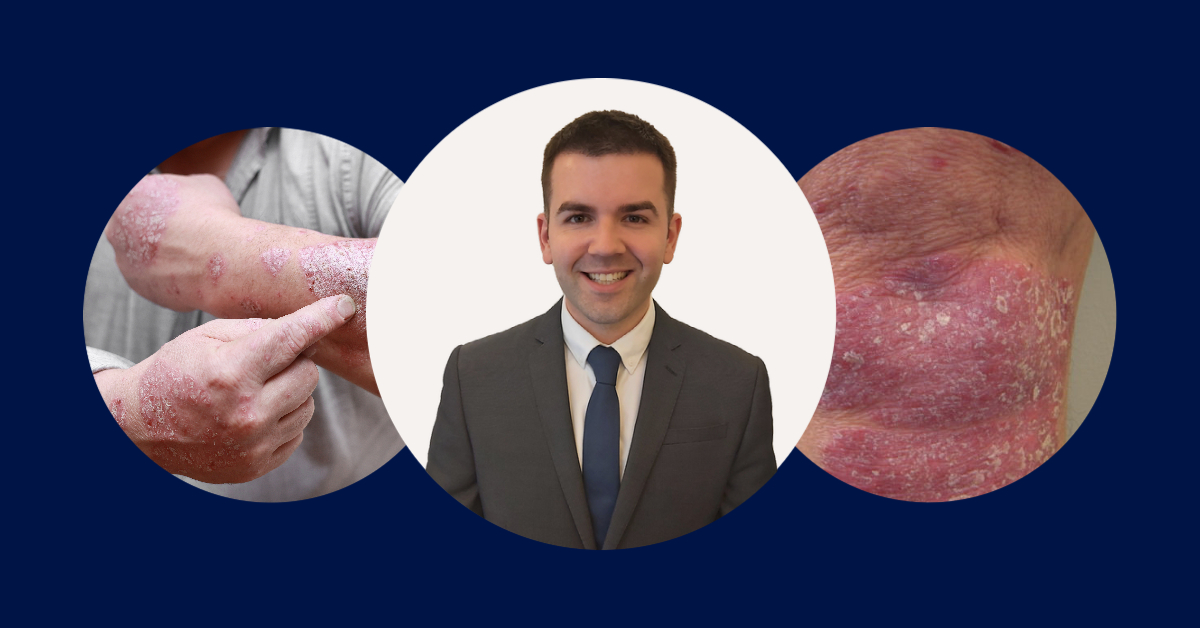Psoriasis Awareness Month with Dr Bryan Murphy, Consultant Dermatologist
14th, Aug 2023

Psoriasis is a chronic inflammatory skin condition that arises in patients with a genetic predisposition. This means that it runs in families and patients who frequently recall a relative with the disorder. Triggering factors for a psoriasis flare up in some of those with a genetic predisposition might include; throat infections, illness, stress and traumas such as tattoos and scar injuries.
1. Are there different types of psoriasis? Do they have distinguishing characteristics?
Yes, indeed there are. These tend to be based on what the psoriasis looks like or where on the body it is located. Smaller, generalised plaques are seen with 'guttate' psoriasis - this type can commonly present itself after throat infections for some patients. Larger plaques are labelled as 'chronic plaque psoriasis'. This condition can often involve a patient's scalp, genitals and/or nails. Flatter and less scaly patches seen in skin-fold areas such as the armpits, under breasts or groin creases are referred to as 'flexural psoriasis'. Other types include 'pustular' psoriasis which presents as widespread pin head white or yellow pus-filled spots on a background of an uncomfortable red rash, and 'palmoplantar' psoriasis whereby it primarily affects a patient's hands and feet.
2. What are the common treatment options available for psoriasis, and how do they work to alleviate symptoms?
I often talk about a treatment ladder that I work through on a stepwise approach with my patients, however, specific treatment plans are tailored to each patient and the type and severity of their psoriasis.
- All patients will benefit from an emollient to moisturise their skin, soften any scales, sooth itching and enhance absorption of any active treatments.
- Topical steroid creams, ointments, lotions and foams provide anti-inflammatory treatment to actively inflamed psoriasis and are very safe to use if patients follow the treatment regimen prescribed by their clinician.
- Vitamin D analogues and tar-based treatments are other therapies a patient might receive to reduce plaque size and thickness, both during, possibly with a topical steroid, and after a flare as maintenance therapy.
- Phototherapy, or ultraviolet light therapy, is a potential next step on the ladder for some patients if topical treatments are not providing enough relief. Sunbeds should be avoided and are not a substitute for medically supervised phototherapy.
- Oral treatments and biologic injections are reserved for the more severe psoriasis cases. Such treatments are prescribed only by a dermatologist for psoriasis and require blood monitoring and regular clinic appointments. They have more potential side effects than topical agents, however, can provide much better results for very widespread or stubborn psoriasis and are safe to use when supervised by a specialist.
3. Are there any lifestyle factors or environmental triggers which individuals with psoriasis should be aware of?
Generally speaking, as psoriasis arises due to genetic predisposition, there is little one can do to prevent it arising if you have an underlying tendency. I always advise my patients to comply with their treatments as prescribed and maintain a healthy and balanced diet and lifestyle. Holistically, not only is this good for all patients' general health and wellbeing, but it also keeps cardiovascular risk reduced as psoriasis in itself is now recognised as an independent risk factor.
Some other general points patients should know about their psoriasis include:
- Excessive alcohol intake can be associated with more severe psoriasis and a poor response to treatment.
- The condition demonstrates a phenomenon called 'koebnerisation' whereby plaque can appear at sites of trauma such as tattoos, wounds and surgical scars.
- Psoriasis increases the chance of developing a type of arthritis, so I encourage my patients to raise any concerns about their joints early with their dermatologist or general practitioner.
4. Does psoriasis affect mental health? How can dermatologists address this when creating treatment plans?
Like any new diagnosis, patients will take time to come to terms with it and fitting in 'applying creams' to their daily routine. Some people adjust more easily than others to, what can be, a stressful time. Furthermore, flaring psoriasis and working with creams at home to get it back under control might also lead to worry, stress and heightened anxiety.
To help my patients, I make sure they understand their treatment plan and have a printed copy or a photograph of it to keep as a reference after their consultation. I may also direct patients to some of the fantastic free support groups and resources for any patient to access, irrespective of what stage they are at on their psoriasis journey. A few examples include the 'Healthy Skin for All' hub by the British Association of Dermatologists or The Psoriasis Association
For more information on Dr Murphy’s services, please click here and to arrange a consultation with Dr Murphy, please text BOOKNOW to 66777.
Recent Articles

